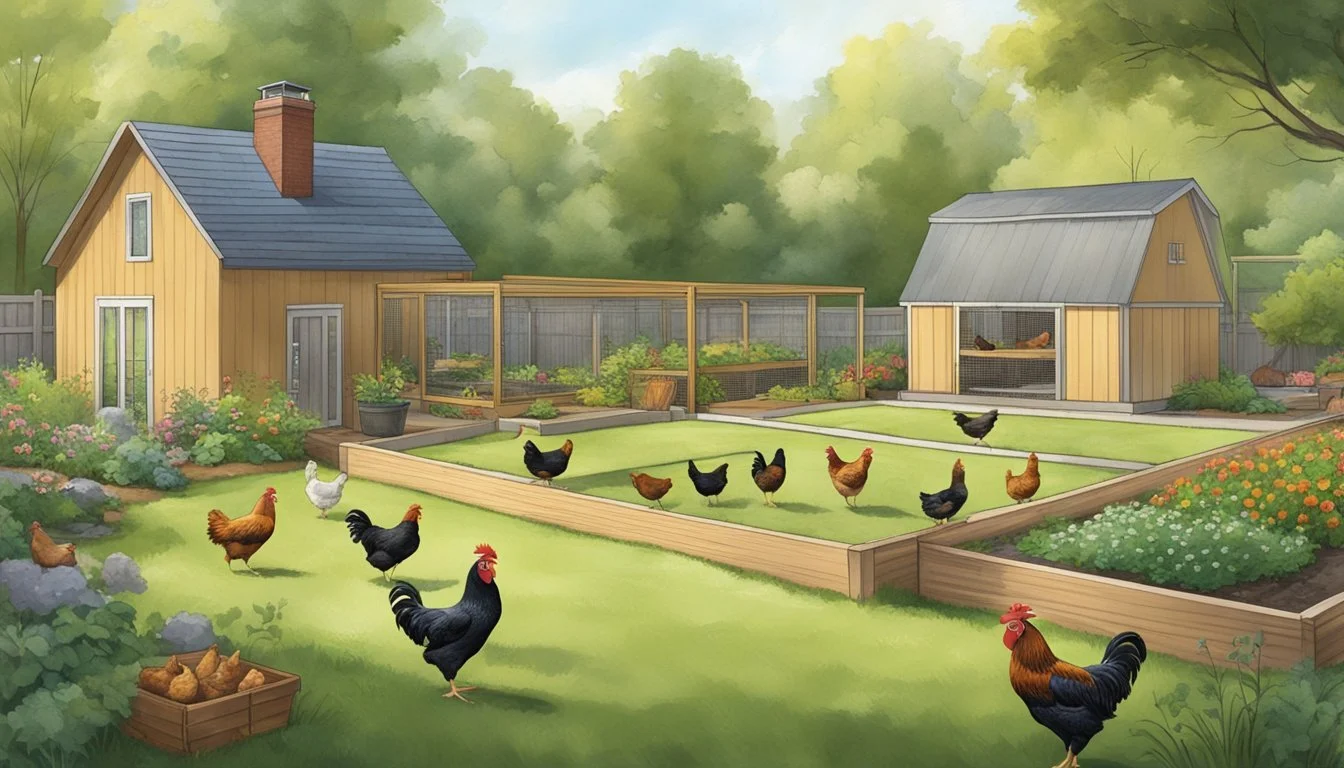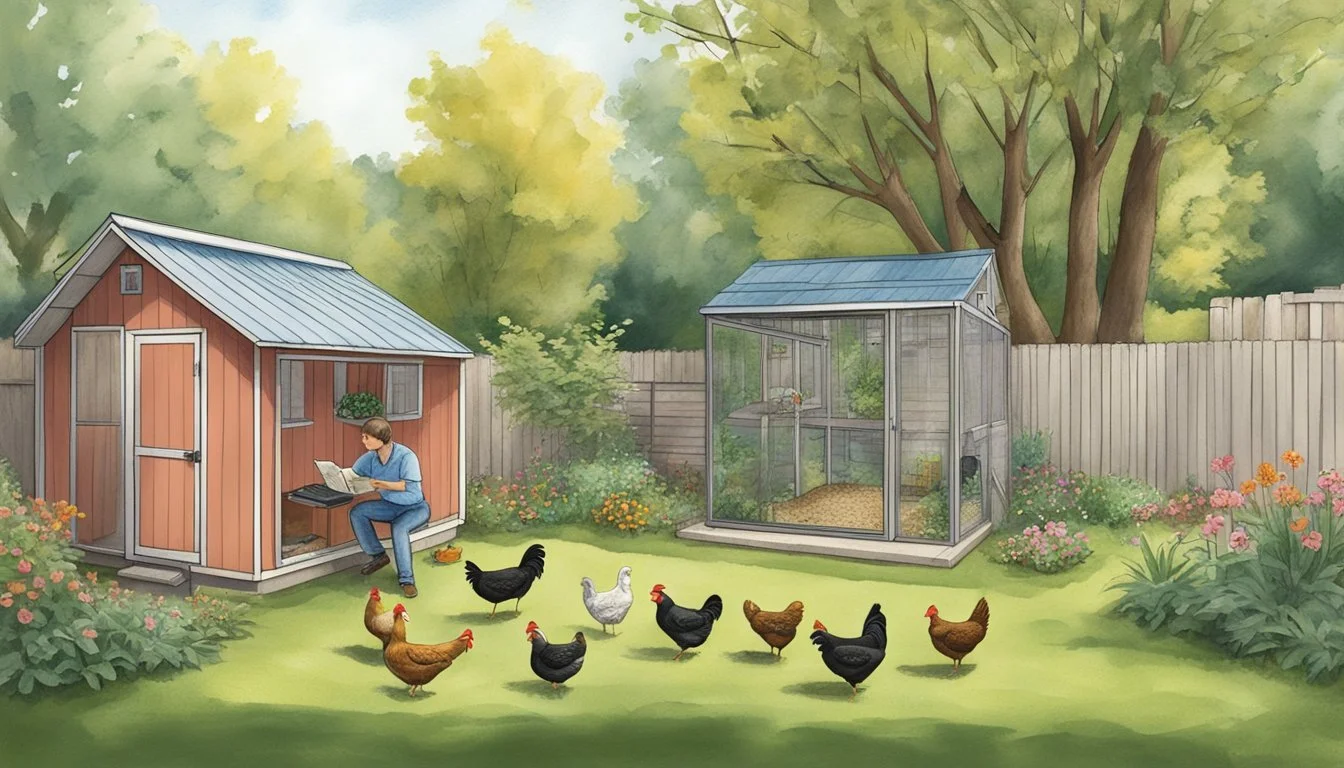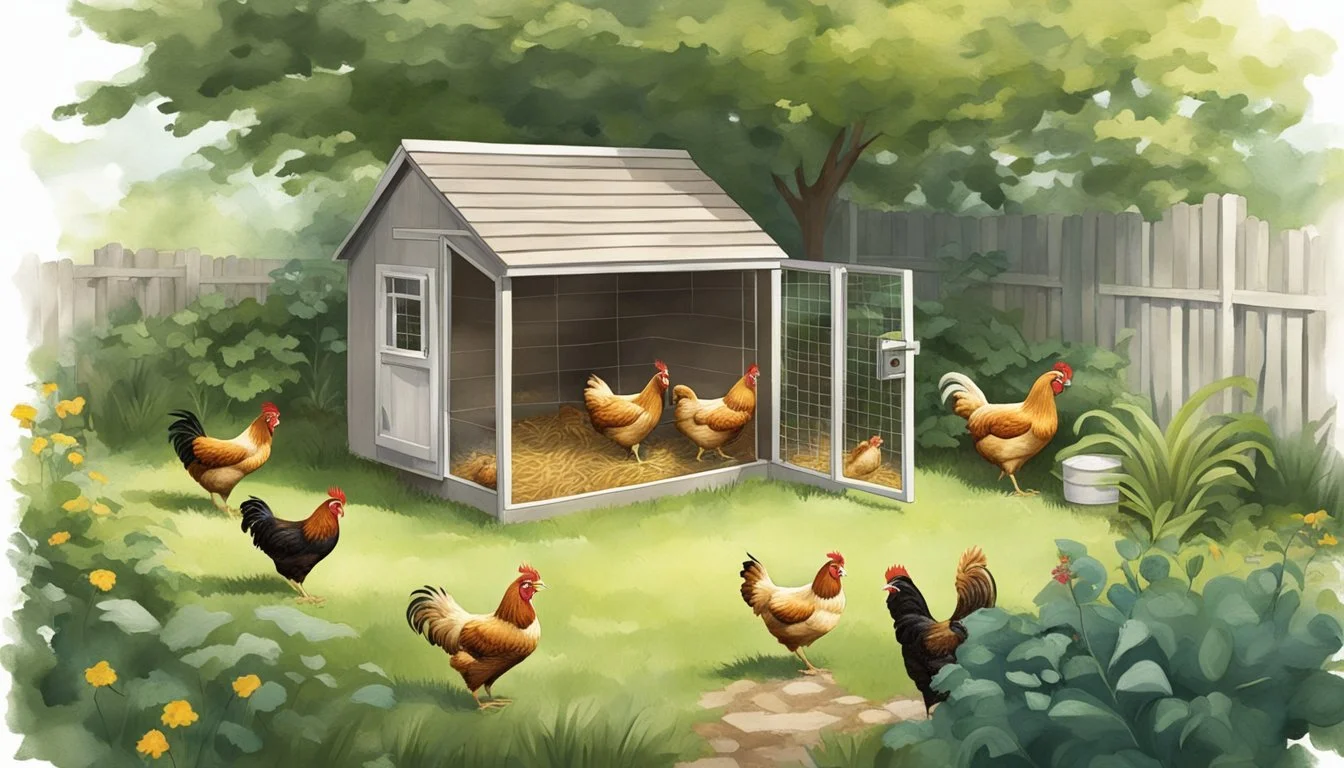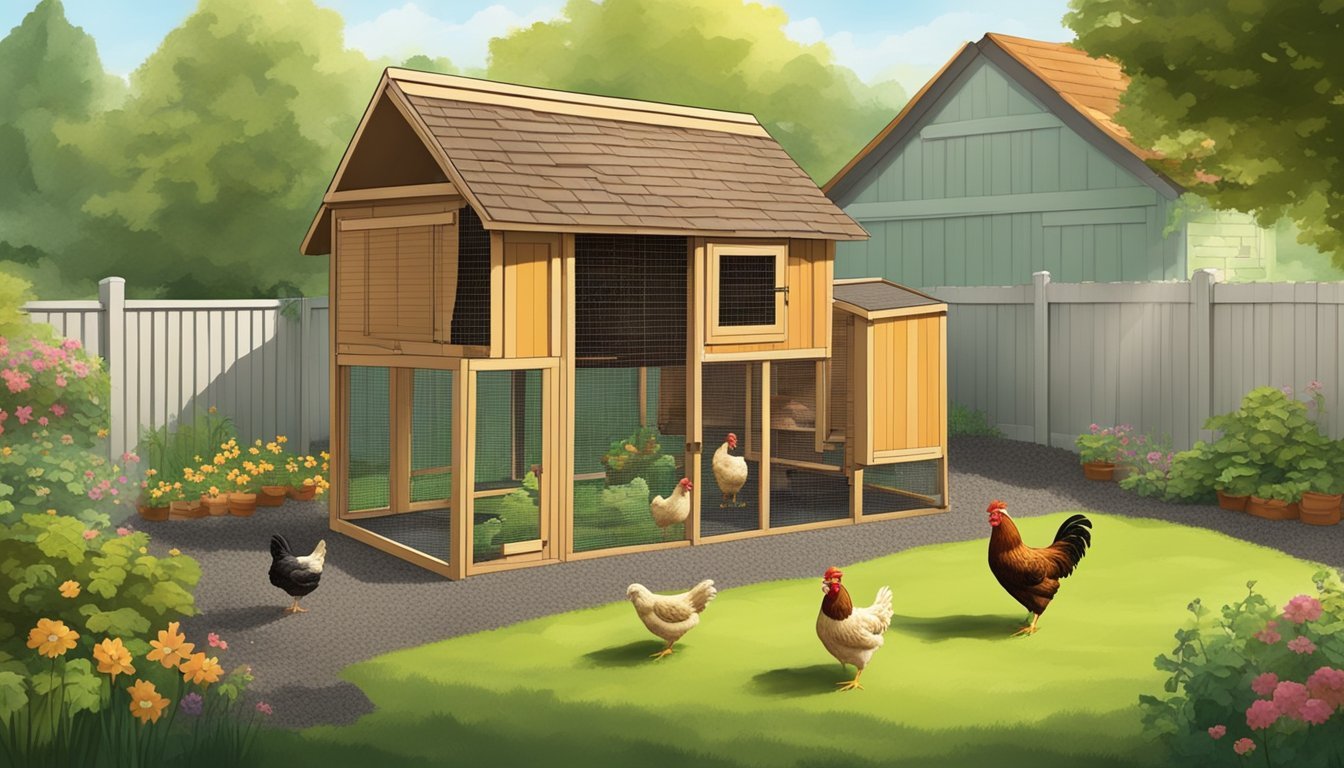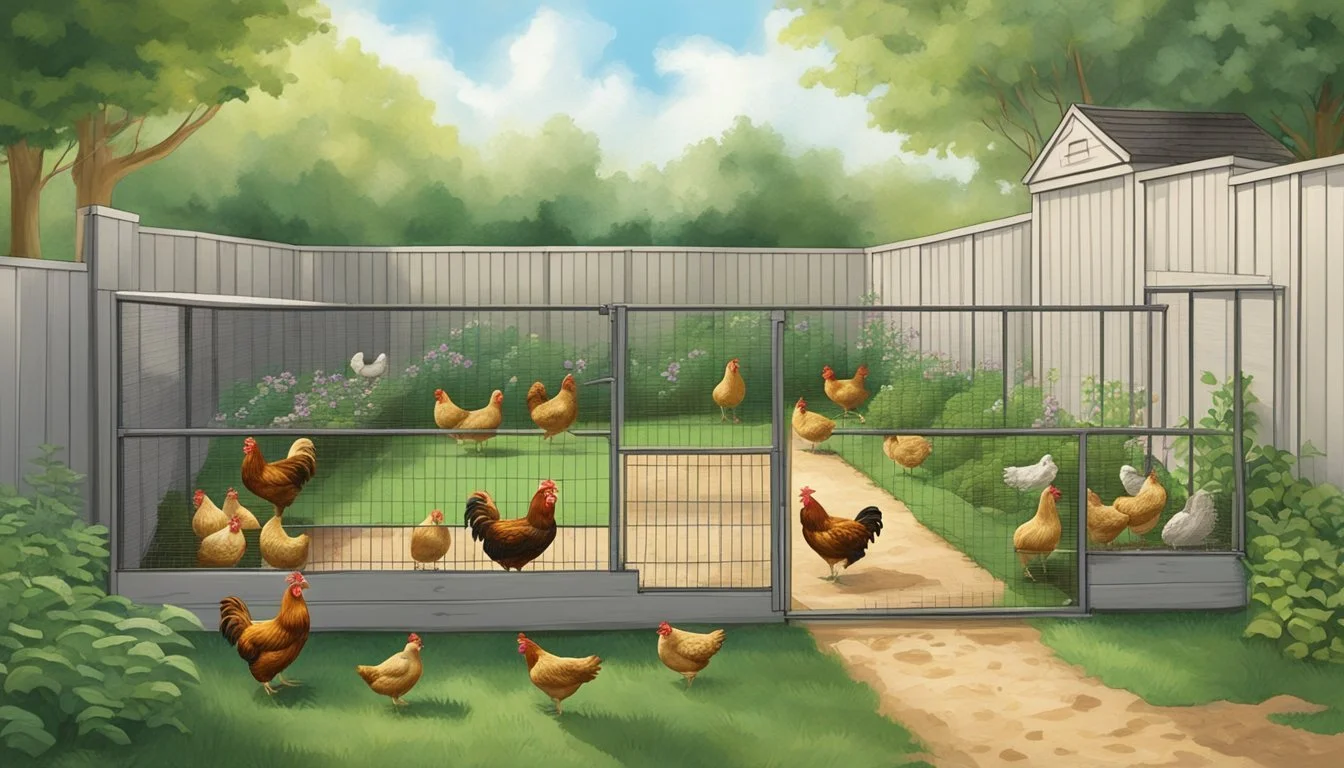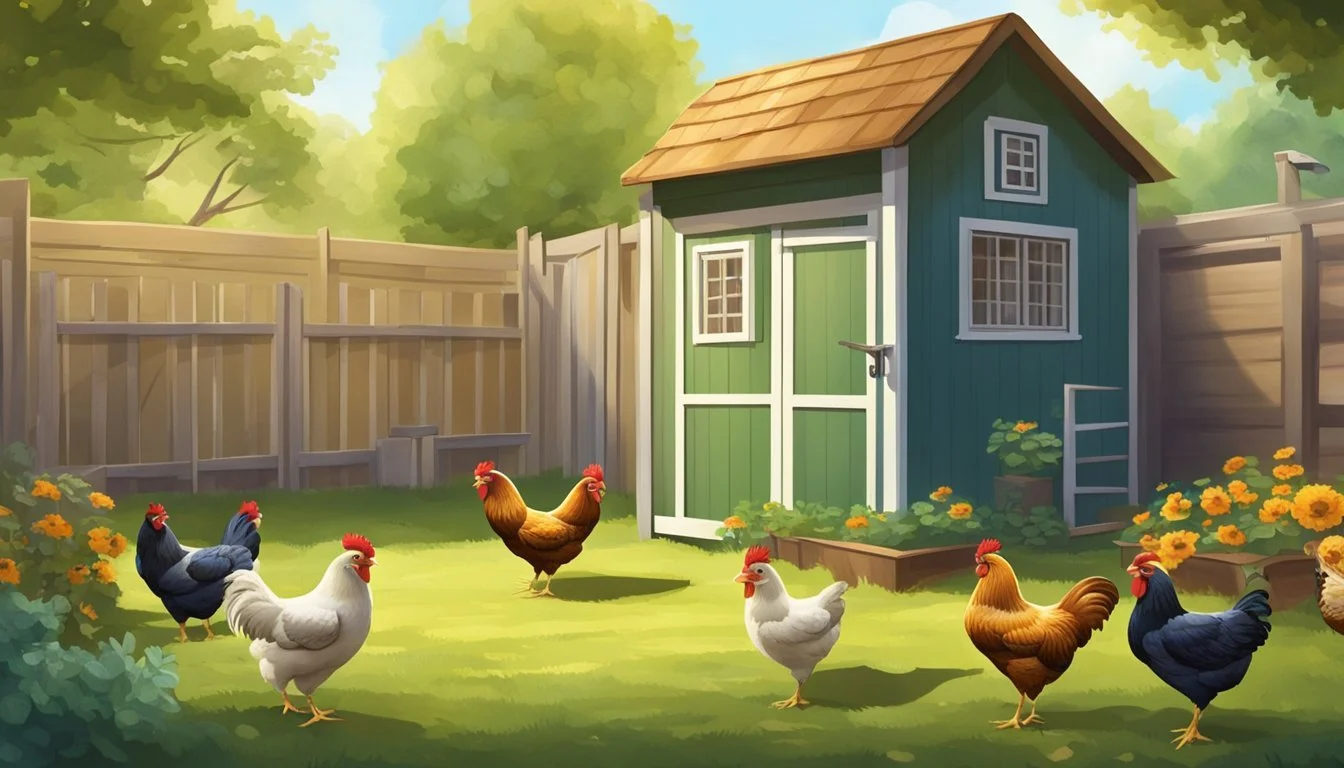Keeping Backyard Chickens in Madison, WI
Essential Tips for Urban Poultry Farming
In recent years, the urban homesteading movement has gained significant momentum, bringing activities like backyard chicken keeping into the mainstream of city living. Madison, the capital city of Wisconsin, has been part of this trend, reflecting a growing interest in local food production and sustainable living practices. Residents have embraced the idea of raising chickens within city limits, drawn by the prospects of fresh eggs, natural pest control, and the pleasure of caring for these birds.
The City of Madison has established regulations to facilitate backyard chicken keeping in a way that respects both the welfare of the animals and the community. To maintain harmony in densely populated areas, the city allows residents to keep up to four chickens on their property, with the stipulation that certain conditions are met to manage noise and cleanliness. A covered enclosure is mandatory and must be placed at least 25 feet from any residential structures on adjacent lots. These measures ensure chickens are kept in a humane manner while minimizing any potential disruption to neighbors.
Madison's approach to urban poultry reflects a blend of flexibility and pragmatism, having recently expanded its limits to accommodate the growing interest in backyard chickens. Adjustments to local ordinances, such as doubling the permissible number of chickens from four to eight, showcase Madison's responsive and evolving stance on urban agriculture. This responsiveness indicates a recognition of the role backyard chickens can play in sustainable urban living, providing residents with a direct connection to their food sources while fostering a sense of community through shared experiences and challenges.
Legal Overview
Navigating the legal landscape of keeping backyard chickens in Madison, Wisconsin, requires understanding the relevant local ordinances, securing proper city permits, and being aware of applicable state and county laws.
Understanding Local Ordinances
The City of Madison allows residents to keep chickens, under specific conditions mandated by local ordinances. It's essential for potential chicken owners to first consult the chicken ordinance. This regulation outlines the prerequisites and limitations to legally keep chickens within city limits. For instance, there is a ban on keeping roosters due to noise concerns and a no-chickens-allowed ordinance may apply in certain zoning districts.
City Permits and Regulations
Madison requires residents to obtain a permit for keeping chickens. The process involves an application for an annual license, and compliance with several guidelines:
Permit Fee: A fee of $10.00 for the license.
Enclosure Distance: Coops must be situated at least 25 feet away from neighboring residential structures.
Maintenance: The chicken enclosure must be clean and free from pests.
Limitations: Residents are restricted to a maximum of four chickens, and on-site slaughter is prohibited.
State and County Laws
In addition to municipal regulations, chicken keepers in Madison must adhere to Wisconsin state and Dane County laws regarding the treatment of animals and public health concerns. These laws ensure the welfare of the chickens and safeguard the community from potential health issues. They often operate in concert with local laws, reinforcing the importance of maintaining proper cleanliness and animal care practices.
Local governments, including municipalities like Madison, typically have the authority to create more specific and stringent laws than those at the state or county level, so it's vital to comply with all levels of legislation.
Getting Started
Before embarking on the rewarding journey of raising backyard chickens in Madison, WI, prospective chicken keepers need to be well-versed in choosing suitable breeds, constructing a secure habitat, and providing for the birds' daily needs.
Choosing the Right Breeds
When starting a backyard flock, it's crucial to select breeds that are well-adapted to the local climate and your egg production expectations. In Madison, breeds like Plymouth Rock, Rhode Island Red, and Sussex are known for being hardy and laying a considerable number of eggs. Hens are typically preferred over roosters due to noise considerations and local regulations.
Building or Buying a Coop
Chickens require a safe and comfortable coop for shelter. Keepers have the option to build or purchase a coop. When building a coop, ensure it meets Madison's zoning requirements, which might involve obtaining a building permit. Alternatively, using a mobile chicken tractor can sometimes avoid the necessity for a permit. Coops should provide at least three to four square feet per chicken, proper ventilation, and protection from predators.
Chicken Care Essentials
Appropriate care for chickens encompasses a consistent supply of food and water, routine cleaning, and protection against elements and predators. A chicken's diet should include layers' pellets for hens producing eggs and a mix of grains and greens to maintain their health. Fresh water must always be accessible. Lastly, regular cleaning of the coop is essential to prevent diseases and parasites, ensuring a clean environment for the birds and fresh eggs for consumption.
Health and Welfare
Proper health and welfare of backyard chickens in Madison, WI requires diligent care, particularly in their feeding, disease prevention, and the management of common health issues. Adhering to appropriate practices ensures chickens remain healthy, which in turn protects both the birds and their human caretakers from potential health risks.
Feeding and Nutrition
Chickens need a balanced diet rich in nutrients. A typical chicken's diet should include:
Layer pellets or crumbles: High in calcium, they support eggshell strength.
Grains and seeds: Offered in moderation, they provide energy and protein.
Fruits and vegetables: A source of vitamins and variety, but only in small amounts to prevent diarrhea.
Clean, fresh water: Available at all times to prevent dehydration, essential for a chicken's health.
It is imperative to avoid foods that can be toxic to chickens, such as avocado, raw beans, and chocolate.
Preventing Diseases
To minimize disease risks, one should maintain sanitary conditions in and around the coop. This involves:
Regular cleaning of the coop to reduce the buildup of droppings which can harbor Salmonella or Campylobacter bacteria.
Proper disposal of bedding and waste to deter pests and rodents.
Vaccinations according to local veterinary guidance for preventable diseases.
Limiting exposure to wild birds and their droppings, as they can carry diseases transmittable to domestic poultry.
Monitoring for signs of illness and acting quickly if symptoms are observed is crucial. Safe handling practices, such as washing hands after contact, further reduce the risk of transmitting pathogens to humans.
Addressing Common Health Issues
Common issues in backyard chickens include parasite infestations, respiratory problems, and lead poisoning from environmental sources. To address these:
Parasitic worms: Perform regular fecal tests and administer deworming treatments as recommended by a veterinarian.
Respiratory infections: Ensure good ventilation in the coop while protecting chickens from drafts to prevent respiratory ailments.
Lead exposure: Avoid placing coops near old painted structures or areas with known lead contamination in the soil. Regularly replace and maintain water sources to prevent lead ingestion.
By paying attention to these key areas, caretakers can maintain the health and welfare of their backyard chickens, ensuring they are productive pets and provide safe, healthy eggs.
Community Considerations
When keeping backyard chickens in Madison, WI, residents must consider the impact on the community. Careful management of noise and odor, proactive engagement with neighbors, and an understanding of the process for handling complaints are essential for harmonious urban poultry farming.
Managing Noise and Odor
Residents should take steps to minimize noise and control odors from their backyard chickens to prevent them from becoming a public nuisance. Noise primarily comes from roosters, which are typically not allowed in city limits; however, even hens can be noisy. To address this:
Daily Maintenance: Clean the coop regularly to control odor.
Strategic Placement: Locate coops away from neighbor’s windows and outdoor living spaces.
Engaging With Neighbors
It is important for chicken owners to maintain open communication with their neighbors. Being considerate can often prevent issues related to backyard chickens.
Dialogue: Inform neighbors of your plans and address concerns such as smell and noise.
Visibility: Consider the line of sight from your neighbor's property and try to keep coops unobtrusive.
Handling Complaints
If a complaint arises, the matter may involve the village clerk or a medical officer. Residents should be prepared to address issues in a formal manner.
Point of Contact: The village clerk is often the first point of contact for issues.
Resolution Process: Understand the steps for resolving disputes, which may involve visits from a medical officer to assess public health concerns.
Compliance and Consequences
Maintaining backyard chickens in Madison, WI, requires adherence to specific municipal regulations, and overlooking these can lead to penalties. Keeping up with local ordinances is vital as they can change, affecting how residents engage in this practice.
Penalties for Non-Compliance
Failure to comply with Madison's chicken keeping regulations can result in fines or revocation of the permit required to keep chickens. Residents must ensure coops are clean, pest-free, and situated at least 25 feet away from neighboring residential structures. Non-compliance with these standards can trigger consequences defined by the city's animal services or code enforcement departments.
Updates to Local Regulations
The City of Madison occasionally updates its ordinances related to backyard chickens. Recent changes have altered the number of hens allowed on residential property. It's imperative for residents to stay informed about these updates to ensure compliance and avoid penalties. For the most current rules, residents should consult the city's official website or contact municipal authorities.
Advocacy and Changes in Law
Community members have the power to influence local laws regarding backyard chicken keeping. Those seeking modifications to existing ordinances can engage in advocacy or contact their city representatives. Legislation at the state level can also impact local rules, as seen with moves by Wisconsin legislators to standardize backyard chicken regulations across various municipalities.
Additional Resources
For residents of Madison, WI, interested in raising backyard chickens, an array of resources is available to support and educate them on best practices. This section outlines local groups, educational material, and informative radio segments tailored to Madison's community needs.
Local Support Groups
Madison's local support groups offer a platform for both novice and experienced chicken keepers to share knowledge, tips, and camaraderie. Residents may look for community groups on social media platforms like Facebook, or check announcements at neighborhood centers for meet-ups and workshops. Local feed stores also often have bulletin boards listing upcoming events and groups.
Educational Material
The City of Madison provides extensive educational resources to help residents understand the requirements for keeping chickens. The Public Health Madison & Dane County website outlines guidelines for safe handling and care of backyard chickens, ensuring proper hygiene and animal welfare. Educational materials can be accessed on city websites, at public libraries, or through local extension services.
Wisconsin Public Radio Segments
Wisconsin Public Radio has featured segments discussing the nuances of raising backyard chickens, with input from experts and policymakers like Shae Sortwell. These segments cover topics from legislative changes to personal experiences of Wisconsin's chicken keepers. Listeners can learn about state-wide initiatives and gain insights into the practice of keeping poultry in urban settings.
To find relevant segments, one can search the WPR website for past shows, which provide an audio resource for those interested in various aspects of backyard chicken care.
Local Variations
Legislation concerning the keeping of backyard chickens varies widely across Wisconsin cities, impacting the regulations homeowners must follow.
Case Study: Madison, WI
In Madison, homeowners may keep up to eight hens, but roosters are not allowed. A $10 annual permit is required, and the chicken pen must be kept at least 25 feet away from the neighbors' dwellings.
Comparison: Milwaukee and Green Bay
In contrast, Milwaukee does not permit chickens in residential areas. Green Bay, on the other hand, allows residents to have up to four birds over eight inches tall per residence, but similar to Madison, roosters are not permitted, ensuring noise levels are kept to a minimum.
Emerging Trends in Caledonia and Ellsworth
While Caledonia, WI, and Ellsworth, WI, do not yet have widespread legislation regarding backyard chickens, there is a growing interest in the trend. This interest might lead to formal ordinances in the future, allowing or regulating the keeping of chickens within city boundaries.
Beyond Chickens
In the sphere of urban agriculture, the conversation often extends past chickens to include a variety of other fowl, each with their potential impacts on the community and the movement toward more robust urban farming practices.
Considering Other Fowl
When examining alternatives to backyard chickens, residents of Madison might ponder raising ducks, geese, quail (What wine goes well with quail?), or guinea fowl. Each species comes with its specific needs and considerations. For instance:
Ducks often require access to water for health and hygiene, and their diet can differ slightly from chickens'.
Geese serve as good "watchdogs" but need more space and can be more aggressive.
Quail are smaller and quieter, making them a potential option for tighter spaces.
Guinea fowl are known for their pest control capacities but can be noisy.
Adequate shelter akin to a chicken coop should be provided for any fowl to ensure protection from predators and harsh weather conditions.
Community Impact
The presence of fowl other than chickens in an urban setting can have varied effects on the community. Noise levels and the animals' potential to become a nuisance are primary concerns. Some fowl, notably guinea fowl, can be louder than chickens, which may lead to neighbor disputes. On the positive side, different types of fowl can contribute to biodiversity and offer educational opportunities to residents about diverse bird species and their care.
Expansion of Urban Farming
Incorporating a mix of fowl can signify the expansion of urban farming, allowing residents to experience beyond what chickens can offer. This expansion can also reflect in:
A broader range of eggs and poultry meat options for local diets.
Enhanced sustainability through varied pest control and reduced food waste, as different fowl consume different diets.
Increased self-sufficiency for urban dwellers in their food sources.
Each species' contribution to urban agriculture should be evaluated for its suitability to the local environment and adherence to city regulations.

